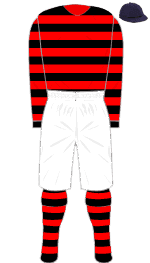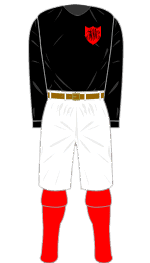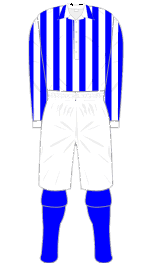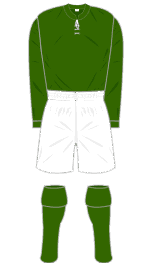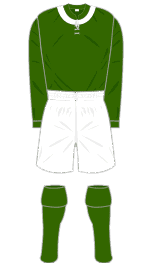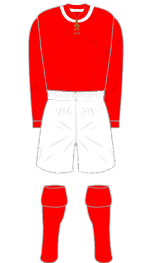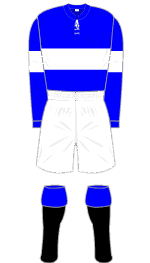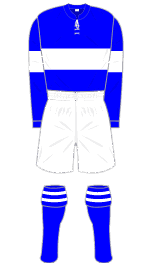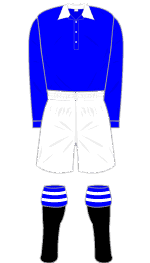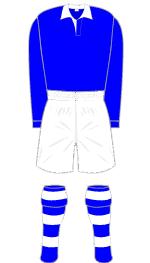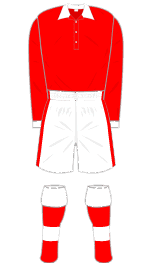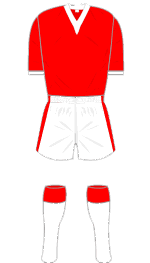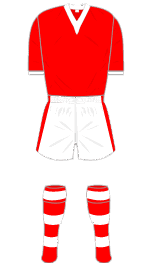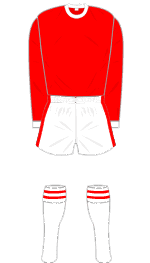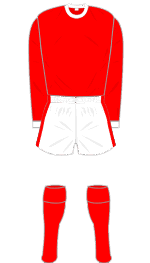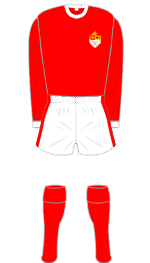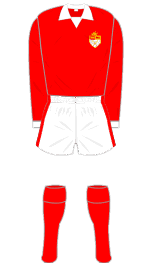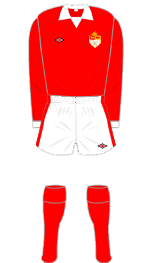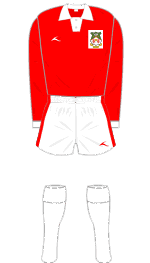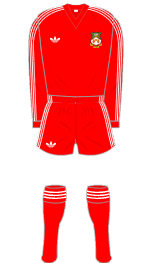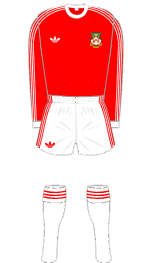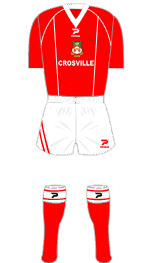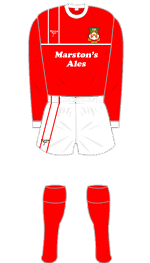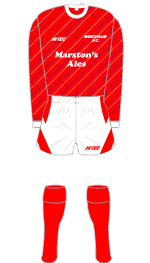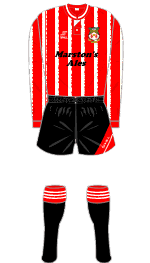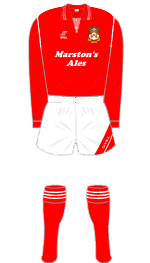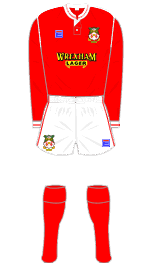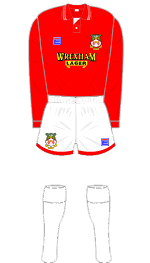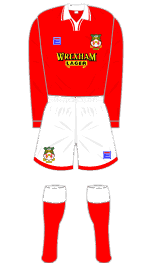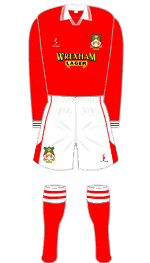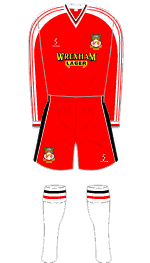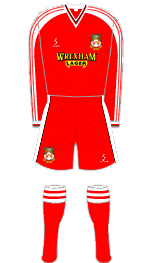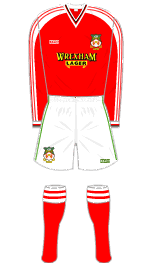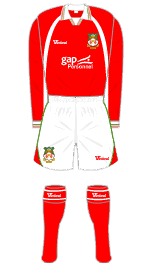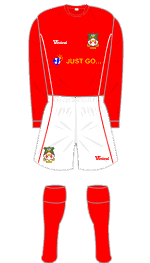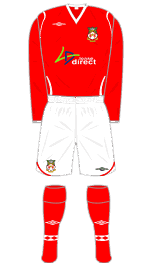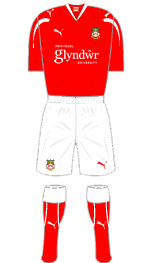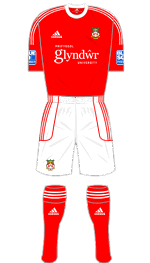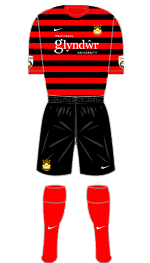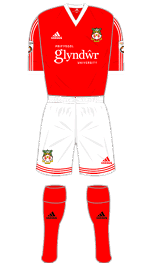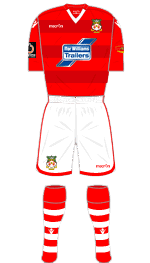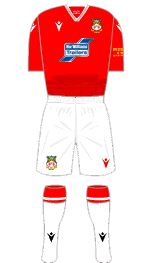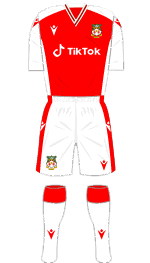| 1877-78 | Welsh Cup Winners |
| 1878-79 | Welsh Cup runner-up |
| 1881-82 | Welsh Cup winners (2nd time) |
| 1888-89 | Welsh Cup semi-finalists |
| 1889-90 | Welsh Cup runner-up |
| 1890-91 | Founder member of The Combination. Welsh Cup runner-up |
| 1891-92 | Welsh Cup semi-finalists |
| 1892-93 | Welsh Cup Winners (3rd time) |
| 1893-94 | Welsh Cup semi-finalists |
| 1894 | Left The Combination |
| Joined Welsh Senior League | |
| 1894-95 | Welsh Cup runner-up |
| 1895-96 | Welsh Cup runner-up. Welsh Senior League Champions |
| 1896-97 | Re-joined The Combination. Welsh Cup Winners (4th time) |
| 1897-98 | Welsh Cup runner-up |
| 1898-99 | Welsh Cup runner-up |
| 1899-00 | The Combination runner-up |
| 1900-01 | The Combination Champions |
| 1901-02 | The Combination Champions (2nd time). Welsh Cup runner-up |
| 1902-03 | The Combination Champions (3rd successive time). Welsh Cup Winners (5th time) |
| 1904-05 | The Combination Champions (4th time). Welsh Cup Winners (6th time) |
| 1905-06 | Joined Birmingham & District League. Welsh Cup semi-finalists |
| 1906-07 | Welsh Cup semi-finalists |
| 1908-09 | Welsh Cup Winners (7th time) |
| 1909-10 | Welsh Cup Winners (8th time) |
| 1910-11 | Welsh Cup Winners (9th time, 3rd in succession) |
| 1913-14 | Welsh Cup Winners (10th time) |
| 1914-15 | Welsh Cup Winners (11th time) |
| 1919-20 | Welsh Cup runner-up |
| 1920-21 | Welsh Cup Winners (12th time) |
| 1921-22 | Founder member of Football League Division Three North. Welsh Cup semi-finalists |
| 1923-24 | Welsh Cup Winners (13th time) |
| 1924-25 | Welsh Cup Winners (14th time) |
| 1926-27 | Welsh Cup semi-finalists |
| 1929-30 | Welsh Cup semi-finalists |
| 1930-31 | Welsh Cup Winners (15th time) |
| 1931-32 | Welsh Cup runner-up |
| 1932-33 | Football League Division Three North runner-up. Welsh Cup runner-up |
| 1939-40 | Football League programme abandoned due to outbreak of war |
| 1946-47 | Welsh Cup semi-finalists |
| 1949-50 | Welsh Cup runner-up |
| 1950-51 | Welsh Cup semi-finalists |
| 1951-52 | Welsh Cup semi-finalists |
| 1954-55 | Welsh Cup semi-finalists |
| 1956-57 | Welsh Cup Winners (16th time) |
| 1957-58 | Welsh Cup Winners (17th time) |
| 1958-59 | Placed in Division Three upon re-organisation. Welsh Cup semi-finalists |
| 1959-60 | Welsh Cup Winners (18th time). Relegated to Division Four |
| 1960-61 | Welsh Cup semi-finalists |
| 1961-62 | Promoted to Division Three. Welsh Cup runner-up |
| 1963-64 | Relegated to Division Four |
| 1964-65 | Welsh Cup runner-up |
| 1966-67 | Welsh Cup runner-up |
| 1969-70 | Football League Division Four runner-up. Promoted to Division Three |
| 1970-71 | Welsh Cup runner-up |
| 1971-72 | Welsh Cup Winners (19th time) |
| 1973-74 | Welsh Cup semi-finalists |
| 1974-75 | Welsh Cup Winners (20th time) |
| 1975-76 | European Cup Winners Cup Quarter Finalists |
| 1976-77 | Welsh Cup semi-finalists |
| 1977-78 | Football League Division Three Champions. Promoted to Division Two. Welsh Cup Winners (21st time) |
| 1978-79 | Welsh Cup runner-up |
| 1980-81 | Welsh Cup semi-finalists |
| 1982 | Relegated to Division Three |
| 1982-83 | Welsh Cup runner-up. Relegated to Division Four |
| 1983-84 | Welsh Cup runner-up |
| 1985-86 | Welsh Cup Winners (22nd time) |
| 1986-87 | Welsh Cup semi-finalists |
| 1987-88 | Welsh Cup runner-up |
| 1988-89 | Not promoted after play-offs |
| 1989-90 | Welsh Cup runner-up |
| 1990-91 | Welsh Cup runner-up |
| 1992-93 | Division Four re-designated Division Three on formation of F.A. Premier League. Football League Division Three runner-up. Promoted to Division Two. Welsh Cup semi-finalists |
| 1994-95 | Welsh Cup Winners (23rd time) |
| 1997-98 | Missed play-offs on goals scored. F.A.W. Invitation Cup winners |
| 1998-99 | F.A.W. Premier Cup (formerly Invitation Cup) runner-up |
| 1999-00 | F.A.W. Premier Cup Winners (2nd time) |
| 2000-01 | F.A.W. Premier Cup Winners (3rd time) |
| 2002 | Relegated to Division Three |
| 2002-03 | Promoted to Division Two. F.A.W. Premier Cup Winners (4th time) |
| 2003-04 | F.A.W. Premier Cup Winners (5th time) |
| 2004-05 | Football League Division Two renamed "League One". Ten points deducted for entering administration, causing relegation to League Two. Football League Trophy winners. F.A.W. Premier Cup runner-up |
| 2005-06 | F.A.W. Premier Cup runner-up |
| 2008 | Relegated to Conference National |
| 2011-12 | Conference runner-up. Not promoted after play-offs |
| 2012-13 | F.A. Trophy winners. Not promoted after play-offs |
| 2014-15 | F.A. Trophy runner-up |
| 2015-16 | Conference changed name to National League |
| 2018-19 | Not promoted after play-offs |
| 2019-20 | Season ended early to due Covid-19 virus. League decided on a points per game basisz |
| 2021-22 | National League runner-up. F.A. Trophy runner-up. Not promoted after play-offs |
| 2022-23 | National League Champions! |
| 2023-24 | League 2 runner-up. Promoted to League 1 |
Wrexham AFC - Beginnings
It is my intention to purchase a football in the course of this week, and I shall expect a good many down to the field next Saturday
Edward Manners 1864
Wrexham Association Football Club was founded in 1864, and is the oldest football club in Wales and the third oldest professional football club in the world.
Our historic ground, The Racecourse is the oldest international football stadium in the world that still holds international matches, most recently hosting Wales men’s team against Trinidad and Tobago in March 2019. With the proposed ground improvements on the horizon, and the subsequent increase in capacity, we can hopefully expect further international activity at the true home of Welsh football. The record attendance at the ground was set in 1957, when Wrexham AFC hosted a 4th Round FA Cup match on January 26th 1957 against Manchester United in front of 36,445 fans.
As the name of the ground suggests, The Racecourse was originally just that, a racecourse. Race gatherings had been held in Wrexham at various sites since the 16th century, however in 1739 the racecourse was established and The Wrexham Races turned into a significant annual event, both for the town and the surrounding areas. A public house known as ‘The Turf Tavern’ was added to the racecourse facilities to serve racegoers sometime between 1793 and 1819.and another complimentary licenced premises, ‘The Grandstand’ was added in the 1830’s next door to provide food and drink for the more well-off visitors. They could also watch the races from a purpose-built balcony that overlooked the finishing line at the rear of the property.
Significantly for the future of Wrexham AFC, at this time, the then racecourse landowner gave his patronage to a local cricket club, who established a cricket pitch in the middle of the racecourse.
In 1854, a stone-built, stand on Mold Road was constructed to replace the temporary timber stands that were erected each year and dismantled when the race meetings ended, while a part of The Turf Tavern was also adapted to provide offices and a weighing room for race officials. However, due to the popularity, and accessibility, of the course to the ‘working class’, the once genteel nature of the various race festivals became festivals of drunkenness and public disorder, which resulted in the landowner withdrawing his support for the races which ceased in 1857. However, due to the subsequent loss of trade suffered by local businesses local officials were lobbied to have the races re-established, but this failed in the face of opposition from the church and a growing temperance movement in the town, which signified the death knell of racing in Wrexham.
There was still a need to provide alternative forms of entertainment and occupation of time for the former race goers, and a new organisation ‘The United Volunteer Services Club’ was founded in 1863, specifically to provide athletic sport for the town’s population, particularly in the winter months. At the first meeting of the group on the 12th October 1863, the founding members made a pledge to raise funds for the purpose of securing premises to facilitate athletic sport, but two of the members- Charles Edward Kershaw and Evan Morris were also members of The Wrexham Cricket Club and they used their influence within the cricket club to bring athletic sport to the Racecourse.
At the end of cricket season dinner in The Turf Tavern on the 4th October 1864, the cricket club chairman- Edward Manners, announced;

Edward Manners
‘There is one thing, gentlemen. I wish to name, the great want of amusement in this town in winter time. It is my intention to purchase a football in the course of this week, and I shall expect a good many down to the field next Saturday. It was only yesterday I called upon the Mayor and he said he should like to see an athletic club established in Wrexham. If we have athletic sports and cannot obtain a room suitable for holding them in we can have them on the green.’
A football pitch had been established at the Racecourse, but at 90 degrees to the current layout.
The newly formed Wrexham Football and Athletic Club played their first ever game on the 15th October 1864 between ten of the Prince of Wales Fire Brigade and ten of the Club, which resulted in an easy victory for the fire brigade, they winning the two first goals out of three. These are the ten founding members who represented Wrexham in the club’s first ever game on The Racecourse: Charles Edward Kershaw (Captain), William Tootell, Thomas Henry Sykes, Thomas Broster, Thomas Hanmer, Edward Ephraim Knibbs, Thomas Heath, John Taylor, Joseph Roberts and George Rumsey Johnston.
At the end of that first football season the club members voted to use all of the profits to establish an annual athletic sports day on The Racecourse, with the first sports day taking place on May 8th 1865. The sports day proved to be popular, and was repeated at the end of each football season, while horse racing was also gradually re-introduced on The Racecourse, until it was finally completely abandoned in 1913.
Of those founding members of The United Volunteer Services Club, Charles Edward Kershaw would later serve as The Vice Chairman of the football club and Evan Morris would become The President of Wrexham Football Club and The Vice President of The Football Association of Wales ( also founded in Wrexham). He was knighted by Queen Victoria during her visit to Wales in 1889. The then owner of The Racecourse- Sir Watkin Williams Wynn was elected to serve as the first President of The Football Association of Wales in May 1876. Edward Manners of The Wrexham Cricket Club also served as The Honourable Secretary for the Football Association of Wales from 1880 to 1882.
The Football Association of Wales was founded in Wrexham in February 1876 by a group of businessmen who wanted to assemble a representative team to play against Scotland, in order to emulate the games between Scotland and England, which had started four years earlier. The first game between Scotland and Wales took place in Partick, Glasgow, in Scotland on 25th March 1876 and the return match was played on The Racecourse Ground on 5th March 1877. Scotland won both games, but The Racecourse became the home of international football in Wales until the start of the 20th century.
Meanwhile, Wrexham Football and Athletic Club had reformed as Wrexham Football Club in October 1872 and they won the first ever Welsh Football Association Cup on its inception, beating Druids 1-0 at nearby Acton Park in Wrexham on the 30th March 1878: the first of a record 23 wins. Wrexham were also credited with creating a new pyramid tactical system, consisting of two backs, three half-backs and five forwards during the 1877/78 season. The system was subsequently adopted by most clubs throughout Wales and England and is still used to this day.
At the start of the 1880/81 season, Wrexham Cricket Club, who were the resident tenants of the lower section of The Racecourse, decided to raise the football club’s rent by £10 per year and this led members of Wrexham Football Club to hold a general meeting, during which, they decided to adopt Rhosddu Recreation Ground as their new home. The change of location also spurred Wrexham FC to change its name to Wrexham Athletic Football Club, and Athletic played their first ever game on Rhosddu Recreation Ground on 10th September 1881, although the club decided to change its name back to Wrexham Football Club at the end of that season.
Wrexham again won The Welsh Cup when they beat Druids 1-0 for a second time, at the (strangely!) neutral venue of The Racecourse Ground on the 21st April 1883. But after the award ceremony the club officials negotiated a new tenancy terms with The Racecourse owner, for a return to their spiritual home in time for the start of the 1883/84 season, and the club have remained at The Racecourse ever since.
Wrexham entered the English F.A. Cup for the first time in 1883, but crowd trouble during a second-round tie against Oswestry on The Racecourse on December 1st led to the club being banned from all English Football Association games, and so they reformed as Wrexham Olympic Football Club at the end of that season with the same players and set up, in fact a continuation of the previous club, and were subsequently re-admitted to the English F.A. Cup for the 1884/85 competition. On 1st September 1884, Wrexham Football Club play its first game under the Olympic name in an historic match played ‘under electric lights’ against Oswestry. The game was described as “illuminated by the electric light that proved satisfactory.”
The ‘Olympic’ name lasted until the beginning of the 1888/89 season, when the club were once again renamed as Wrexham Football Club which also coincided with the club’s best run the English FA Cup since first entering the competition. They reach the first round where they lost 1-0 to London Swifts. Two years later, Wrexham were one of the twelve clubs who founded the second incarnation of The Combination League, although rising travel costs and expenses would force the club to abandon the league to become founding members of a new Welsh League, which Wrexham won twice, but gate receipts drop because of the lesser opposition, and they re-joined the Combination League in 1896.
Wrexham won The Combination League four times, and also won The Welsh Cup that year without a goal having been scored against them and were winners of The Shropshire Mayors Charity Cup and The Denbighshire and Flintshire Charity Cup in the same year. The club were then elected to join The Birmingham District League for the start of the 1905/06 season; however, at the end of that season, Wrexham secured the services of two players from Nottingham Forest and Aston Villa, and paid half of the transfer fees to each of the players. This kind of transaction was permitted under Welsh association rules but not under English rules, and so the club were again struck off from The English Football Association membership list. Wrexham appealed against the ban, but the decision was initially upheld, although the English F.A. soon rescinded and for a number of years, the practice was accepted under English association rules.
The team continued to play in the Birmingham District League, while also competing in both the English and Welsh F.A. competitions; winning the latter for consecutive years between 1909 and 1911. International matches were also still being played on The Racecourse, which had hosted more international games than any other football stadium in the world at that time, but there was competition from other clubs in Wales, and so in 1912 the officials of Wrexham Football Club made a pledge to The Football Association of Wales that they would improve the facilities on The Racecourse, in order to host the international match against Scotland on 3rd March 1913. Additional concrete terracing was laid and the banks behind each goal were raised to provide spectators with a better view, while both of the public houses in the stadium were renovated and the properties were joined together and renamed ‘The Turf Hotel’. Wales played out a 0-0 draw against Scotland on that day.
Wrexham A.F.C. continued their dominance in the Welsh F.A. Cup, winning the trophy in 1914 and 1915, although by that time The Racecourse had been handed over to the army as a drill field, as professional league football was stopped during the First World War, but resumed again in 1919 when Wrexham re-joined The Birmingham District League. The club also set up a fund to buy new equipment, repair damage and amend the alterations that had been made during the war, and a supporter’s association was established for the purpose of raising such funds. And the Supporters Association continue that support to this day.
Wrexham AFC Timeline
Our Colours
Wrexham AFC have worn almost every possible colour combination of shirts over the years. In the nineteenth century their inaugural black and red horizontal stripes became dark and light blue halves, alternating blue with white sleeves and stripes of the same colour. By the turn of the century Wrexham started wearing designs incorporating green shirts. The first red and white combination was worn just after the First World War. Not for long however because blue returned with a broad white hoop across the chest and the sleeves. All-blue arrived by the Thirties and remained until after the Second World War. At this point the red shirts reappeared to stay up to the present day.
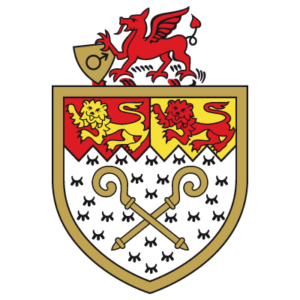
 Strangely, it wasn’t the ‘red’ that gave rise to the previous Club nickname ‘The Robins’. It came from a club secretary in the first half of the 20th century, whose name was Ted Robinson, also manager at the time, hence the ‘Robin’s Team’. Wrexham took on the “Red Dragons” nickname at the start of the 2001/2002 campaign. Their initial badge, not on the shirts until the 1960’s, was the Wrexham Borough’s coat of arms which were granted in 1857. One crozier in the shield represents Wrexham Abbott which formerly belonged to Valle Crucis Abbey. The other crozier, like a shepherd’s crook, signifies the grazing land around Wrexham and alludes to the wool sales, which were one of the principal industries of the area. The shield also includes two lions from the arms of Wales. In the crest, the Welsh national emblem of the dragon is charged with the astronomical symbol for Mars.
Strangely, it wasn’t the ‘red’ that gave rise to the previous Club nickname ‘The Robins’. It came from a club secretary in the first half of the 20th century, whose name was Ted Robinson, also manager at the time, hence the ‘Robin’s Team’. Wrexham took on the “Red Dragons” nickname at the start of the 2001/2002 campaign. Their initial badge, not on the shirts until the 1960’s, was the Wrexham Borough’s coat of arms which were granted in 1857. One crozier in the shield represents Wrexham Abbott which formerly belonged to Valle Crucis Abbey. The other crozier, like a shepherd’s crook, signifies the grazing land around Wrexham and alludes to the wool sales, which were one of the principal industries of the area. The shield also includes two lions from the arms of Wales. In the crest, the Welsh national emblem of the dragon is charged with the astronomical symbol for Mars.
The present club badge originates from a competition in 1973 coinciding with Wrexham’s celebration of the (as thought at that point) hundredth anniversary of their first ever match. From the hundreds of entries submitted the club eventually chose the design that is worn to this day.

